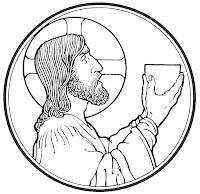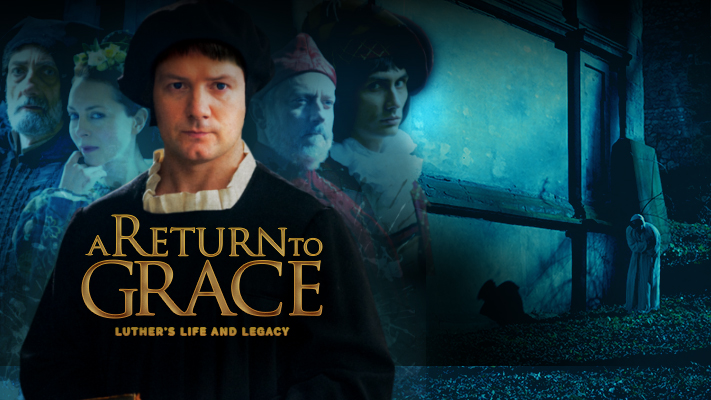LUKE 24:13-35
THE TRUE WORD GIVES TRUE HOPE.
M: Alleluia! Christ is risen!
Cong: He is risen indeed! Alleluia!
In the name + of Jesus.
For the most part, false teachings and false hope have their origins from God's truth. That should not surprise you. When Satan speaks, he tries to sound like Jesus. But Satan distorts God's word just a little bit. The result is that it sounds right, but that God's people are led astray.
For example, there are many churches which teach that the Bible contains God's word. It sounds right. When we hear, “The Bible contains God's word,” we would not respond, “No, it doesn't!” But if we accept that the Bible contains God's word, the follow up question is: “What else does it contain?” If there are parts of the Bible which are not God's word, we are left to wrestle with what is God's word and what is not. The result is that we decide what is divine truth and what can be dismissed. We end up telling God what his own word is. So, a statement which sounds pretty good ultimately ends up being blasphemous. We believe, teach, and confess that the Bible is God's word. All Scripture is God breathed. (2 Timothy 3:16) The whole Bible is God's word. The whole Bible is true. Therefore, we can trust all that the Bible has to say to us. The true word gives true hope.
The disciples who were on their way to Emmaus were grief stricken, and it is because they had put their faith in popular opinion instead of God's actual promises. When Jesus asked them what had been going on which made them so sad, they summed up the weekend pretty well. “Jesus of Nazareth [was] a man who was a prophet mighty in deed and word before God and all the people.... [Our] chief priests and rulers delivered him up to be condemned to death, and crucified him. But we had hoped that he was the one to redeem Israel. Yes, and besides all this, it is now the third day since these things happened.” (Luke 24:19-21) And they went on to describe the empty tomb and the message of the angels there.
Their assessment of Jesus was accurate, but their hope in him was misplaced. Cleopas and his friend were victims of their day. The confessed, “We had hoped that he was the one to redeem Israel.” (Luke 24:21) They had hoped that Jesus would take up the throne of David, would restore David's kingdom, and bring back to Israel the power and glory which David had enjoyed. They thought Jesus would be the source of a new and magnificent glory, but they were crushed when all their hopes for glory were crushed.
Now, once again, much of what they said was true, but their hope was misplaced. Jesus had, indeed, come to redeem Israel. The Son of David has taken up his throne. He does, indeed, bring a new and magnificent glory. But Jesus had also declared, “My kingdom is not of this world.” (John 18:36) The glory that Jesus brings is an everlasting kingdom, but we will not see that glory in this world. It will come just as we confess: “We look for the resurrection of the dead, and the life of the world to come.” (Nicene Creed) The true word gives true hope.
The Emmaus disciples were not alone in their misguided hopes. We, too, hold to promises that God did not make. We, too, look for glory which the Lord has not promised. While God has made many amazing promises to us, those promises often cause us to assume others. Does being Christians mean that life is easier and that you will not be bothered with problems? If you have believed that, you have also been sorely disappointed. We are sinners who live among sinners in a sinful world. We will have problems with people who sin against us. Our own sinfulness causes us to view people with suspicion, jealousy, or disgust. Our own sins produce guilt and shame in us. Our bodies suffer the effects of age, disease, sorrow, pain, and finally death. Nowhere does God say you are immune from these things. To think that being a Christian equals God pouring out material blessings on you means that your faith rests in promises God did not make—just as the Emmaus disciples did. That will always lead to disappointment. It may well cause you to believe that God is a liar because he has not produced. Do not be deceived. Not every pious sounding comment is based on God's word. Satan mimics God, but still twists God's word.
The true word gives true hope. Does God promise blessings upon his people? Yes. Does God promise a collection of goods, friends, or smiles? No. If you have these, you can thank God for them, but he did not guarantee them to you, and he does not guarantee you will keep them. If you want to be sure that your faith is resting on promises God has actually made, you had best read, learn, and study the Bible to know what those promises actually are. Then Satan will not deceive you. Only the true word gives true hope.
That is why, when Jesus walked with the Emmaus disciples, he kept himself from being recognized by them. They did not need to see the risen Savior; they needed to be reminded of the promises God had actually made. And beginning with Moses and all the Prophets, he interpreted to them in all the Scriptures the things concerning himself. (Luke 24:27) Only the true word will give true hope. We do not have time to consider all that God had promised. We have Bible classes for that. But we will consider one promise.
The patriarch Job had confessed: “I know that my Redeemer lives, and at the last he will stand upon the earth.” (Job 19:25) If we have a Redeemer, then it must cost him something to redeem us from our captors. It is sin, death, and the devil which has laid a claim on all mankind. The devil claims. Sin controls us. And death marks us all. But we have a Redeemer! And every blood sacrifice offered from the time of Abel to the time of Jesus testifies that it is the bloody death of a substitute which is the payment for the sins of man. Therefore, our Redeemer poured out his blood and willingly laid down his life to be the ransom price which has purchased and won us from our captors. We have a Redeemer, and the cost for him to redeem us was the life of our immortal God. Thanks to Jesus' innocent sufferings and death, thanks to the bloody death of your substitute, you are free from your sins. You have been released from Satan's claim. And the grave cannot have you. You have been marked for eternal life, not eternal death.
But Job's confession was not, “I know that my Redeemer will die.” Job confessed, “I know that my Redeemer lives, and at the last he will stand upon the earth.” (Job 19:25) If the Redeemer lives, and if he is to stand upon the earth on the Last Day even after he has paid the full price for our ransom, then he must overcome death. Then he must be risen! And just as God has promised it, so Jesus Christ has fulfilled it. Your Redeemer lives, and he lives to assure you of your forgiveness, to keep you free from Satan's grasp, and to deliver you from the grave to life everlasting. The true word gives you true hope.
Only after Jesus reminded the Emmaus disciples of his promises did he finally make himself known to them. And their joy increased all the more. The Redeemer lives, and we are his redeemed! The true word gives you true hope.
Satan will always mimic the true word and try to lead you astray. Your defense against him is the true word of God which will never lie to you or lead you astray. That word, on the contrary, will strengthen you, comfort you, and encourage you. It will fill you with godly desires and produce in you good deeds. This word is why God's church gathers every Sunday. This is why your church offers Bible classes, Catechism instruction, and Sunday School. Satan would prefer you fill your week with other activities. He will even tell you that the other activities will produce a full and happy life. There is a degree of truth in that. There usually is when Satan speaks. You might enjoy an early round of golf, a leisurely breakfast, or an extra hour of sleep. These are not evil. But your Lord summons you to hear his word which delivers to you a good, God-pleasing, and everlasting life. If you know and stand on his promises, you will be neither deceived nor disappointed; you will be secure. And you will be saved. For only his true word can give you true hope.
In the name of the Father and of the Son + and of the Holy Spirit. Amen.

















